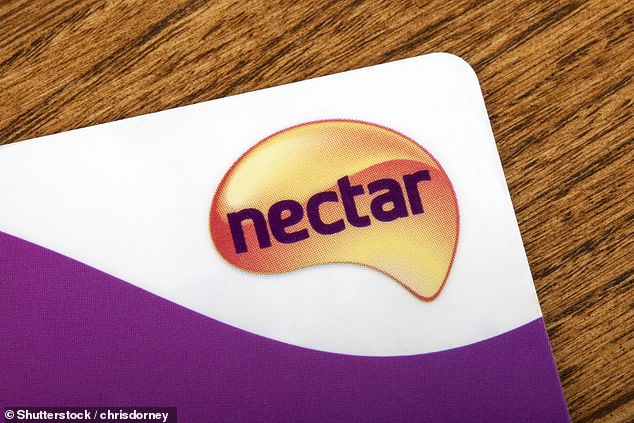Loyalty cards have become a must-have for many consumers, who fear having to pay over the odds as supermarkets offer exclusive deals to members.
James* had spent just shy of two years collecting Sainsbury’s Nectar points and had amassed nearly 74,000 points worth £370.
But when he went to check his account online at the start of this year, he was shocked to find his account had been cleared entirely.

Nectar scam: James* discovered 74,000 points worth £370 had been used by fraudsters
The account showed two small transactions in Hackney, East London, and three larger ones in a petrol station in Enfield.
One of them used 47,000 points, equivalent to £235.
James, whose name has been changed at his request, lives more than 100 miles away in Gloucester and was not in London that day.
Thankfully Nectar was quick to respond, issuing a replacement card, reinstating his former balance and adding 2,000 bonus points.
But James was keen to find out how his Nectar points could be spent in a different part of the country, and without the physical card.
Two days later, he called one of the stores in Enfield to ask whether they could look at their CCTV system to pinpoint the thief, but was told he’d need to speak to a manager. He did not manage to get through.
Unfortunately for James*, Nectar card scams are not a new phenomenon and have been doing the rounds for a number of years.
The Nectar card scheme was launched in 2002, and it is one of the largest loyalty schemes in Britain.
Each Nectar point is worth 0.5p, so to save up a £1 worth of Nectar points, customers will need 200 of them. This means 500 Points are worth £2.50, 1,000 points are worth £5 and 2,000 points are worth £10.
Unlike a bank card, a Nectar card does not have a chip and does not have secondary authentication, meaning it can be easier for criminals to use.
However, with CCTV in most, if not all, Sainsbury’s stores, it shouldn’t be hard to track down the culprits.
James said: ‘I had heard of this some time ago and thought I was immune from such a scam.
‘Having since watched Youtube videos and researched the subject, I didn’t realise how easy it was for a determined person to steal someone’s points without the need to see the card, have access to the card or even know me.
‘But as I have the time and date of the transactions, I believe it is possible to identify the culprit(s) concerned.’

Spree: The person who fraudulently accessed James’ Nectar account spent a large chunk of the cash at a petrol station in Ealing (stock image)
Sainsbury’s tight-lipped over account breach
This Is Money contacted Sainsbury’s, who owns Nectar, to ask why nothing had been done to help find the culprit(s) and how his points were used without a card.
A spokesperson said: ‘The security of our customer accounts is our highest priority.
‘We have a range of monitoring in place to help us to detect, and in many cases prevent, fraud.
‘We also encourage our customers to be vigilant with their own personal information, such as ensuring passwords are unique and not shared across multiple platforms.
‘Our customer services team has investigated and spoken to confirm the fraudulent activity on his account.
‘We have also reimbursed him for the Nectar points which were stolen and provided an additional 2,000 Nectar points as a gesture of goodwill. A new card should arrive within a few days.’
While the points may have been reinstated, it does not explain how the points had been used, or help other Nectar card holders who want to protect themselves from these types of scams.
Most surprisingly, Sainsbury’s have suggested victims refer the issue to the police – rather than dealing with the problem itself.
A spokesperson said: ‘CCTV footage in our stores is stored for 31 days before it’s overridden. Due to data protection the customer is responsible for reporting any issue to the police. We can then support an investigation in any way we can.’
James* did try to report the scam to Action Fraud two days after the event, but it told him it was not possible for the police to investigate.
He was told: ‘It is not a police recordable crime. Where the details are used to obtain goods or services, we can only record a crime on behalf of the person or organisation which was defrauded as a result of the misuse of an identity’.
Action Fraud did not respond to a request for further clarification.
Some links in this article may be affiliate links. If you click on them we may earn a small commission. That helps us fund This Is Money, and keep it free to use. We do not write articles to promote products. We do not allow any commercial relationship to affect our editorial independence.




